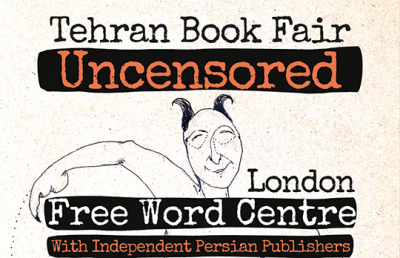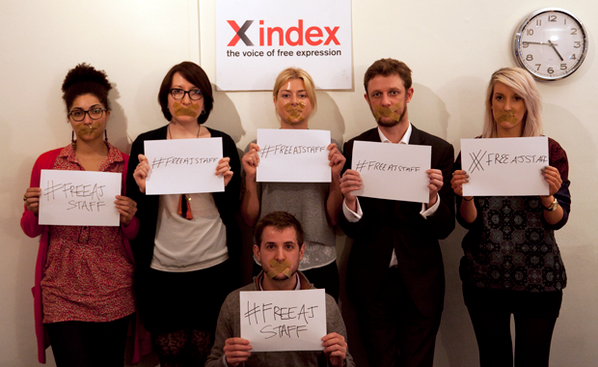Index relies entirely on the support of donors and readers to do its work.
Help us keep amplifying censored voices today.

Join us for the first ever Tehran Book Fair Uncensored in Britain, an event featuring an independent book fair and a discussion on censorship in Iran since the 1979 Iranian Revolution.
Taking place on 6-7 May 2016 at London’s Free Word Centre, the book fair coincides with the Tehran Book Fair, but unlike the Iranian counterpart, it’s free from censorship, and will feature censored books from independent Iranian publishers.
Most of the event will be in Farsi, but there will be an English-language session too on Friday 6 May from 4.30pm to 5.30pm – in association with Index on Censorship and Small Media.
Displayed books will range from novels to social science and from plays to history. Participants will also have the chance to see broadcasted footage from the Tehran International Book Fair, and to get to know the publishers and authors and buy signed books.
Participating publishers at the book fair will include:
The English-language event on Friday 6 May will focus on censorship in Iran and will include a talk from Index on Censorship about its work across the Middle East. During this session, Small Media will also present Writer’s Block, an online interactive data visualisation of censorship in Iran since the 1979 revolution.
The event is free, but booking is required through Free Word Centre’s website.
When: English-Language event with Index on Censorship and Small Media, Friday 6 May 2016, 4.30pm. Farsi events: Friday 6 May 2016, 11am – Saturday 7 May 2016, 6pm
Where: Free Word Lecture Theatre at the Free Word Centre (map)
Tickets: Free, but booking required through Free Word Centre’s website. Tickets grant entry to the fair but the talks cannot be pre-booked – entry to these is allocated on the day on a first come, first served basis (lecture theatre capacity: 90 people).
 Peter Greste and his colleagues Mohammed Fahmy and Baher Mohamed have been imprisoned in Egypt since 29 December 2013. They are now on trial facing charges related to terrorism, along with six other journalists being tried in absentia. They are among many local Egyptian journalists and media workers who have been detained by the Egyptian authorities.
Peter Greste and his colleagues Mohammed Fahmy and Baher Mohamed have been imprisoned in Egypt since 29 December 2013. They are now on trial facing charges related to terrorism, along with six other journalists being tried in absentia. They are among many local Egyptian journalists and media workers who have been detained by the Egyptian authorities.Please join the world’s press in a Global Day of Action on Thursday 27 February with peaceful demonstrations, silent protests and individual images to demand their release. Send a message to Egypt and the world: if you silence the press, you silence us all.What we can do in the UK:In London – supporters are to meet at Trafalgar Square at midday on 27 February – taping their mouths closed in solidarity.
Across the UK – newsrooms, offices, shops, commuters, tourists – are asked to stop at midday and cover their mouths with whatever is at hand, take a selfie and post it online using the hashtag #FreeAJStaff.
Please sign the Petition, pass the message on and join this Global Day of Action in any way you can:
http://www.thepetitionsite.com/583/945/591/freeajstaff-release-detained-al-jazeera-journalists/
Two activists climbed to the roof of the Bahrain embassy in London yesterday. Prominent opposition activist Ali Mushaima was joined by Moosa Abdali to protest human rights violations in Bahrain, ahead of this weekend’s controversial Grand Prix. The pair scaled scaffolding on a neighbouring building in Belgrave Square. Mushaima claimed he was protesting in solidarity with two of the country’s political prisoners, his father Shi’a politician Hassan Mushaima, and prominent activist Abdulhadi al-Khawaja. The activist criticised the decision to allow the Grand Prix to go ahead at the weekend, saying by doing so, Formula 1 supports “dictatorship, torture and repression.”
The evictions of Occupy London sites at St Paul’s Cathedral and the School of Ideas show a systemic contempt for the right to protest if that dissent threatens profit.
The 80 people living at the St Paul’s site and the 40-50 living at an abandoned school building near Old Street were greeted in the small hours of the morning with police vans, bailiffs, riot cops and a gaggle of press photographers. Supporters received text messages and tweets from people on site and those who could make the post-midnight journey came down to stand in support or rubberneck over the police lines set up around it. Occupy’s tech team began a long night of tweeting and livestream broadcasts. As the sun rose over a hazy London, the bulldozers arrived at the School of Ideas and before most people had finished their breakfasts and set off on their morning commutes, the abandoned Islington school was no more. And St Paul’s was, for the first time since 15 October 2011, clear of tents and banners.
After a decision from the Court of Appeal was passed to prevent an appeal for protesters to remain encamped on the St Paul’s site, life there began to show signs of strain. The weekend before the eviction, most of the residential tents were still in place but some of the larger structures at the side of the cathedral were taken down or relocated. People were pre-empting a “dawn raid” — as in the way the Parliament Square anti-war encampments were evicted. It was no longer a case of if, but when.
So when the floodlights arrived just after midnight with its chorus of riot police and neon-vested bailiffs, they were expected. Some people chose to wear their tents instead of have them destroyed, and others built a structure out of pallets and stood on it in token resistance to the eviction. Police arrested 23 protesters but for the most part, people decamped to the remaining Occupy site at Finsbury Square and began the process of asking “what now?”
The High Court’s decision in favour of the City of London Corporation was an attempt to put the nail in the coffin of the Occupy movement’s protest and dissent. The swathe of evictions across all Occupy sites is the state’s way of trying to bury it. Ahead of the London 2012 Olympic Games, the erection of tents and the possession of sleeping equipment on Olympic sites were declared unlawful. Reports that government ministers are drafting legislation loosely based on part 3 of the Police Reform and Social Responsibility Act 2011 and that they will invoke the London Olympic Games and Paralympic Games Act 2006 to protect Olympic branding and sponsors make this government’s position on what matters crystal clear. This is legislation for the short term that will carry the weight of precedent against your human right to protest in the long term. Do not mess with the money machine. You can have “peaceful protest” but the minute you start cutting near the bone, you will be stopped. Your free speech ends where the profit margin begins.
The bleary eyes of the occupiers are dead today. Their bodies are slumped in exhaustion on a muddy plot of land next to a car park and the Bloomberg building. But their heels are digging into the soil as they vow to carry on.
It matters little what you personally feel about the global Occupy Movement and London’s part in it. You could be devoted to it as a zeitgeist, you can maintain that occupation should be a political tactic used to achieve tangible change or you could say that the sight of riot police on the steps of St Paul’s cathedral at 2am was the most radical thing to come out of that plot of land. The truth is this — gambling by financial institutions around the world has crippled the many for the benefit of the few. The blind eye turned by governments to this wanton destruction of lives shows that our will as the people to form the basis of authority of government has been raped. We are no longer equal before the law.